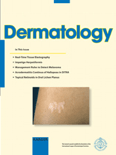
DERMATOLOGY
Scope & Guideline
Fostering collaboration in the pursuit of skin health.
Introduction
Aims and Scopes
- Clinical Research in Dermatological Conditions:
The journal publishes original research articles on various dermatological conditions including psoriasis, atopic dermatitis, hidradenitis suppurativa, and skin cancers, focusing on clinical characteristics, treatment outcomes, and patient management. - Translational Research:
There is a strong emphasis on bridging basic science and clinical practice, particularly through studies that explore molecular mechanisms, genetic predispositions, and novel therapeutic targets in skin diseases. - Patient-Centric Studies:
Research focusing on the quality of life, patient-reported outcomes, and the psychosocial impact of skin diseases is a significant aspect of the journal, highlighting the importance of patient perspectives in dermatological care. - Innovative Therapeutic Approaches:
The journal frequently publishes articles on the efficacy and safety of new and existing treatments for various skin conditions, including biologics, systemic therapies, and novel drug delivery methods. - Epidemiological Studies:
Epidemiological research that investigates the prevalence, risk factors, and comorbidities associated with dermatological diseases is a key focus, contributing to a better understanding of these conditions on a population level.
Trending and Emerging
- Teledermatology and Digital Health:
With the rise of telemedicine, especially during the COVID-19 pandemic, there has been an increase in studies exploring the efficacy and patient satisfaction associated with teledermatology consultations. - Biologics and Immunotherapy:
Research focusing on the effectiveness and safety of biologic therapies for chronic skin conditions, particularly for psoriasis and atopic dermatitis, has gained momentum, reflecting the shift towards targeted therapies. - Psychodermatology:
Emerging studies examining the psychological aspects of skin diseases, including the impact of conditions on mental health and the importance of addressing psychosocial factors in treatment, are becoming more prevalent. - Genetic and Molecular Insights:
There is a growing focus on genetic and molecular research related to skin conditions, including the identification of biomarkers for disease susceptibility and treatment response. - Environmental and Lifestyle Factors:
Research linking lifestyle, dietary habits, and environmental exposures to skin conditions is emerging as an important area of study, highlighting the multifactorial nature of dermatological diseases.
Declining or Waning
- Traditional Surgical Techniques:
There has been a noticeable decrease in articles focusing on conventional surgical techniques for skin lesions, reflecting a shift towards non-invasive and minimally invasive treatment options. - Non-Dermatological Comorbidities:
Studies linking dermatological conditions to broader non-dermatological comorbidities appear to be less frequent, suggesting a narrowing of focus towards more direct dermatological issues. - Basic Science Research:
There seems to be a waning interest in purely basic science studies without direct clinical implications, as the journal increasingly prioritizes translational research that connects laboratory findings to clinical outcomes.
Similar Journals

AUSTRALASIAN JOURNAL OF DERMATOLOGY
Advancing skin science for a healthier tomorrow.Australasian Journal of Dermatology is a leading publication in the field of dermatology, issued by Wiley since 1951, and reaching an audience of researchers, clinicians, and students interested in the latest advancements and practices in skin health. With an ISSN of 0004-8380 and an E-ISSN of 1440-0960, this journal stands out with its Q2 ranking in both Dermatology and Miscellaneous Medicine, positioning it within the top 61st percentile of its category according to Scopus. Although it does not provide Open Access options, Australasian Journal of Dermatology is committed to disseminating high-quality research that informs clinical practices and promotes scholarly dialogue. By publishing rigorous and peer-reviewed articles focused on various aspects of dermatological science, the journal plays a pivotal role in enhancing the dermatology community's understanding of skin conditions and treatments, making it an invaluable resource for professionals and students alike.

Turk Dermatoloji Dergisi-Turkish Journal of Dermatology
Connecting practitioners and researchers to elevate dermatology.Turk Dermatoloji Dergisi-Turkish Journal of Dermatology, published by Wolters Kluwer Medknow Publications, is a prominent platform dedicated to advancing the field of dermatology in Turkey and beyond. With an ISSN of 1307-7635 and an E-ISSN of 1308-5255, this journal plays a vital role in disseminating contemporary research and clinical advancements within the domain. While it is positioned in the Q4 quartile of dermatology journals, its contributions are essential for academics, medical practitioners, and students averse to the latest trends and breakthroughs in skin health. The journal assures accessibility to a broad audience, fostering knowledge exchange, collaboration, and innovation. Given its unique perspective rooted in Turkish dermatological practices, the Turkish Journal of Dermatology serves as a significant resource for enhancing professional competence and driving forward the science of dermatology through its vivid discussions and case studies. For researchers seeking a dedicated venue to publish their work or for professionals eager to stay informed, this journal is an indispensable resource in the ever-evolving landscape of dermatology.
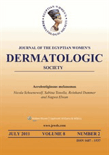
Journal of Egyptian Womens Dermatological Society
Empowering Women's Health Through Dermatological ResearchThe Journal of Egyptian Women's Dermatological Society, published by Wolters Kluwer Medknow Publications, is an essential platform dedicated to advancing the field of dermatology through a valuable focus on women's health issues. Established to provide an open access outlet since 2019, this journal aims to disseminate research, case studies, and reviews that address the unique dermatological needs and concerns of women, particularly in the Egyptian context. Despite its current ranking in the Q4 category in dermatology and a Scopus rank of #117 out of 142 with a 17th percentile, the journal serves a critical role in fostering scholarly communication among researchers, clinicians, and academicians. With a commitment to promoting knowledge advancement and community engagement, this journal invites submissions that align with its objectives, specifically geared towards empirical research and innovative practices in dermatology impacting women's health.

ARCHIVES OF DERMATOLOGICAL RESEARCH
Pioneering Discoveries in DermatologyArchives of Dermatological Research is a premier journal dedicated to the rapidly evolving field of dermatology, published by Springer. With a distinguished history dating back to 1971 and indexed in the top quartiles (Q1 in Dermatology and Q2 in Medicine, 2023), this journal serves as a vital resource for researchers, clinicians, and students alike. It publishes innovative findings, critical reviews, and comprehensive studies that advance our understanding of dermatological conditions and treatments. The journal's commitment to disseminating high-quality research in a field crucial to public health emphasizes the importance of advancing knowledge in skin science and therapy. For those looking to explore significant advancements in dermatology, Archives of Dermatological Research offers an invaluable platform for scholarly discourse and knowledge exchange, though it is not an Open Access journal. Based in Germany, this publication attracts a global audience and remains at the forefront of dermatological research until its anticipated converged years reaching 2024.
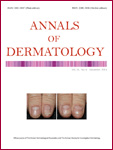
Annals of Dermatology
Uncovering the latest in dermatology since 1989.Annals of Dermatology is a prestigious academic journal published by the Korean Dermatological Association, focusing on the latest research and advancements in the field of dermatology. With a commitment to advancing knowledge in skin health and disease, this journal serves as a vital resource for researchers, clinicians, and students working in dermatology and related disciplines. Since its inception in 1989, it has evolved to consolidate its position in the academic community, boasting a Q2 ranking in the 2023 Dermatology category and a Scopus rank of #87 out of 142, placing it in the 39th percentile. Although it operates under a subscription model, the journal's impact factor reflects its significance in advancing dermatological research, attracting innovative studies and reviews that shape clinical practice. With a publication history extending from 1989 to 1996 and then from 2008 to the present, Annals of Dermatology continues to be an essential publication for those devoted to improving skin health.
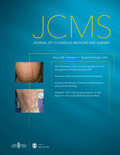
JOURNAL OF CUTANEOUS MEDICINE AND SURGERY
Elevating standards in skin care and surgical techniques.The Journal of Cutaneous Medicine and Surgery is a premier publication in the fields of dermatology and surgery, dedicated to advancing the scientific understanding of skin-related conditions and surgical techniques. Published by SAGE Publications Inc, this esteemed journal features a rich repository of peer-reviewed research, reviews, and clinical studies, ensuring that it remains at the forefront of dermatologic and surgical innovation. With an impressive impact factor and a ranking in the top quartile (Q1) of both dermatology and surgery categories for 2023, it is recognized as a vital resource for professionals, researchers, and students alike. The journal has consistently made significant contributions to the knowledge base that guides clinical practice and surgical decision-making, fostering a deeper understanding of the complexities involved in cutaneous medicine. For comprehensive updates, researchers can access this journal through SAGE’s platform, which supports the dissemination of high-quality research findings to a global audience.
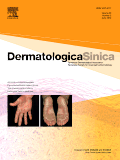
Dermatologica Sinica
Connecting Global Minds in Dermatological AdvancementsDermatologica Sinica, published by Wolters Kluwer Medknow Publications, is an esteemed open-access journal in the field of dermatology that has been disseminating critical research since its inception in 2005. With an E-ISSN of 2223-330X and an ISSN of 1027-8117, this journal presents a platform for researchers, clinicians, and students to share cutting-edge findings and advancements in dermatological science. As of 2023, it proudly ranks in the Q2 category of dermatology journals and holds a notable position at rank #62 out of 142 in the Scopus Medicine - Dermatology category, placing it in the 56th percentile for impact. The journal transitioned to an open-access model in 2016, enhancing accessibility and visibility for groundbreaking studies worldwide. With a commitment to fostering innovation in the dermatological community, Dermatologica Sinica aims to advance the understanding and treatment of skin diseases while encouraging scholarly dialogue among practitioners and researchers across the globe.

Postepy Dermatologii i Alergologii
Bridging gaps in knowledge for skin and allergy specialists.Postepy Dermatologii i Alergologii is a distinguished Open Access journal published by TERMEDIA PUBLISHING HOUSE LTD, dedicated to advancing the fields of Dermatology and Immunology and Allergy. Since its inception in 2003, this journal has served as a vital platform for researchers and practitioners alike, promoting knowledge sharing and collaboration in Poland and beyond. With a current impact ranking placing it in the Q3 quartile for both Dermatology and Immunology and Allergy categories, it plays a significant role in contributing to academic discourse within these fields. The journal is indexed in Scopus, with respectable rankings reflecting its relevance and quality—#65/142 in Dermatology and #163/233 in Immunology and Allergy. Researchers are encouraged to explore a vast array of innovative studies and reviews, making it an essential resource for anyone seeking to stay at the forefront of dermatological and allergic research. For those interested in discovering groundbreaking findings and contributing to the ongoing dialogue in these disciplines, Postepy Dermatologii i Alergologii offers not only free accessibility but also a commitment to scholarly excellence.

JOURNAL OF THE AMERICAN ACADEMY OF DERMATOLOGY
Transforming skin health with every published study.JOURNAL OF THE AMERICAN ACADEMY OF DERMATOLOGY, published by Mosby-Elsevier, stands at the forefront of dermatological research and education. With an impressive impact factor and categorized as Q1 in Dermatology, this journal has established itself as a pivotal resource for healthcare professionals and researchers in the field. Since its inception in 1979, it has provided a platform for high-quality peer-reviewed articles, contributing significantly to advancements in dermatological science and practice through 2024. The journal commands an honorable position, ranking #8 out of 142 in the Scopus database's medicine dermatology category, placing it in the 94th percentile among its peers. Readers can access a wealth of cutting-edge studies, case reports, and reviews that address a broad spectrum of topics, from clinical dermatology to emerging therapies. In addition, the journal's commitment to excellence ensures it remains an essential tool for students, clinicians, and researchers dedicated to improving skin health and furthering knowledge in dermatology.

JOURNAL OF DERMATOLOGICAL TREATMENT
Empowering professionals with cutting-edge dermatological insights.The JOURNAL OF DERMATOLOGICAL TREATMENT, published by TAYLOR & FRANCIS LTD, is a premier forum dedicated to advancing the field of dermatology through the dissemination of high-quality research. Since its inception in 1989, this journal has maintained a significant impact on the dermatological community, currently ranking in the top quartile (Q1) of the Dermatology category with an impressive Scopus ranking of #14 out of 142 journals, reflecting its reputation among peers and its contribution to the clinical and academic landscape. The journal shifted to Open Access in 2023, enhancing the accessibility of groundbreaking findings to researchers, clinicians, and students worldwide. With a commitment to publishing diverse articles, from innovative treatment modalities to comprehensive reviews, the JOURNAL OF DERMATOLOGICAL TREATMENT serves as an invaluable resource for professionals seeking to stay at the forefront of dermatological science in a rapidly evolving field.